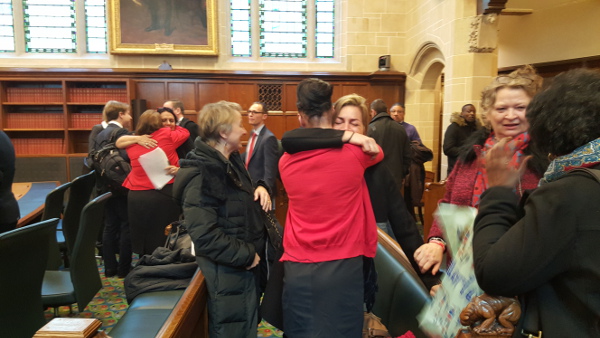Joint enterprise: ‘one of the biggest miscarriages of justice ever to face our justice system’
The controversial common law doctrine of joint enterprise has produced ‘one of the biggest and most widespread miscarriages of justice ever to face our justice system’, it was claimed in a debate in the House of Commons last week. MPs including Labour’s David Lammy and the Conservative’s Andrew Mitchell backed a motion calling on the government to review joint enterprise in a debate secured by the Labour MP Lucy Powell.
‘Parasitical accessory liability’, as it is known, has allowed multiple individuals to be convicted for a crime where they ‘could’ have foreseen the violent acts committed by associates. Prosecutors often employ the principle in murder cases where a group is present at the scene. The law meant that an individual could be found guilty even where they had no physical involvement in the crime.
The debate was called two years after the Supreme Court decided in Jogee that the ‘law had taken a wrong turn’. However, in the same judgment, it was asserted that new and ‘out of time’ appeals must demonstrate a ‘substantial injustice’ prior to any leave for appeal being granted.
As Lucy Powell explained in Parliament, this standard significantly differed from the bar set for other crimes. ‘The substantial injustice test has subsequently been tested through case law and is now an almost impossibly high bar for people to clear.’ Six months after Jogee, the Court of Appeal looked at the first wave of appeals sent back as a result of the ruling. Leave to appeal was denied to all 13 applicants in six cases. There have been no successful appeals in the years following Jogee. Powell described the court as being ‘utterly dismissive of the cases.
The Criminal Cases Review Commission has received 99 fresh applications from people convicted under the old joint enterprise law. It has, however, rejected two-thirds of them and is still considering the remainder.
‘Two years on, the Supreme Court ruling feels increasingly like a pyrrhic victory, with no case from the 30 years in which the “wrong” law was applied being awarded an appeal,’ said Powell. MPs paid tribute to the campaigning work of JENGbA (Joint Enterprise Not Guilty by Association) who reckon to be working with more than 1,000 prisoners convicted of murder or manslaughter under joint enterprise.
A number of MPs flagged up the case of Alex Henry – a young autistic man currently serving 19 years after being implicated in a murder in an incident that lasted less than a minute in West Ealing. You can read his mother Dr Sally Halsall’s account here. On the day of the debate, Alex Henry lodged his appeal with the European Court of Human Rights.
Andrew Mitchell, speaking from the opposite side of the chamber, said young people from ethnic communities had been ‘essentially hoovered up for peripheral and in some cases even non-existent involvement in serious criminal acts’. The Tory MP added that not all members of gangs or groups join in when there was an incident. Humans were by nature ‘social animals’, he said, and mere presence in a group did not alone mean they ‘intended whatever happened to happen’.
David Lammy, the Labour MP for Tottenham, also took issue with the description of groups as ‘gangs’. ‘We do not use the word “gangs” when we are talking about the Bullingdon club; we do when we are talking about black youth in constituencies such as mine or white youth in constituencies such as Salford in north-west England.’ In Lammy’s review looking into the treatment of black, Asian and minority ethnic people in the criminal justice system, it was revealed that up to half of those convicted under joint enterprise were from such backgrounds. It also recorded that almost nine out of 10 of the 3,621 names on the Metropolitan Police’s database of gang suspects were BAME.
The Labour MP Chuka Umunna also pointed out that more than one third (37%) of those serving long sentences for joint enterprise were black which was ‘11 times the proportion of black people in the population’. Lucy Powell noted that more than half were from Black or Asian minority ethnic backgrounds and, according to research from Manchester Metropolitan University, more than half serving these sentences were children or young adults.
In posing the debate, Lucy Powell set out three requests: First, an investigation into whether joint enterprise was being used disproportionately against certain groups. Secondly, she called for an urgent collation of data relating to convictions. Thirdly, the long-awaited outcome of the review into the CPS guidance should be brought forward, ‘and quickly’.
Justice minister, Lucy Frazer, rejected calls for Government to legislate for joint enterprise: ‘What is needed is for the Supreme Court judgment to be followed, there is no suggestion that the law itself needs changing, it’s just that it needs to be enforced.’







